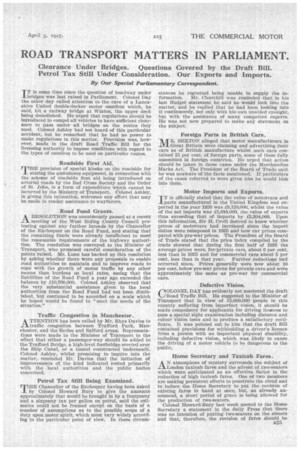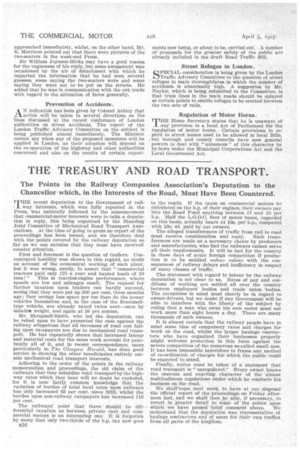ROAD TRANSPORT MATTERS IN PARLIAMENT.
Page 43

Page 44

If you've noticed an error in this article please click here to report it so we can fix it.
Clearance Under Bridges. Questions Covered by the Draft Bill. Petrol Tax Still Under Consideration. Our Exports and Imports.
By Our Special Parliamentary Correspondent.
IT is some time since the question of headway under bridges was last raised in Parliament. Colonel Day the other day called attention to the case of a Lancashire United double-decker motor omnibus which, he said, hit a railway bridge at Winton, the upper deck being demolished. He urged that regulations should be introduced to compel all vehicles to have sufficient clearance to pass under all bridges on the routes they used. Colonel Ashley had not heard of this particular accident, but he remarked that he had no power to make regulations in this matter. Provision was, however, made in the draft Road Traffic Bill for the licensing authority to impose conditions with regard to the types of omnibus to be used on particular routes.
Roadside First Aid.
T"provision of special kiosks on the roadside for storing the ambulance equipment, in connection with the scheme of roadside first aid being introduced on arterial roads by the Red Cross Society and the Order of St. John, is a form of expenditure which cannot be incurred by the Ministry of Transport. Colonel Ashley, in giving this intimation, welcomes any effort that may be made to render assistance to wayfarers.
Road Fund Grants.
ARESOLUTION was unanimously passed at a recent meeting of the West Riding .County Council protesting against any further inroads by the Chancellor of the Exchequer on the Road Fund, and stating that the remaining funds were already insufficient to meet the reasonable requirements of the highway authorities. The resolution was conveyed to the Minister of Transport, who promised careful consideration of the points raised. Mr. Lunn has backed up this resolution by asking whether there were any proposals to enable road authorities to maintain and to improve roads to cope with the growth of motor traffic by any other means than burdens on local rates, seeing that the liabilities of the Road Fund a year ago exceeded the balance by 110,700,000. Colonel Ashley observed that the very substantial assistance given to the local authorities from the Road Fund had not been diminished, but continued to be accorded on a scale which he hoped would be found to "meet the needs of the situation."
Traffic Congestion in Manchester.
ATTENTION has been called by Mr. Rhys Davies to traffic congestion between Trafford Park, Manchester, and the Eccles and Salford areas. Representations were made to the Minister of Transport to the effect that either a passenger-way should be added to the Trafford Bridge, a high-level footbridge erected over the Ship Canal, or a tunnel constructed underneath. Colonel Ashley, whilst promising to inquire into the matter, reminded Mr. Davies that the initiation of improvements of the kind indicated rested primarily with the local authorities and the public bodies concerned.
Petrol Tax Still Being Examined.
THE Chancellor of the Exchequer having been asked by Colonel Howard Bury to give the amounts approximately that would be brought in by a fourpenny and a sixpenny tax per gallon on petrol, said the estimates could not he framed except on the basis of a number of assumptions as to the possible scope of a duty upon motor spirit, which must vary widely according to the particular point of view. In these circum
stances he regretted being unable to supply the information. Mr. Churchill was reminded that in his last Budget statement he said he would look into the matter, and he replied that he had been looking into it continuously, not only with his own unaided eyesight, but with the assistance of many competent experts. He was not now prepared to make any statement on the subject.
Foreign Parts in British Cars. AIR. SEXTON alleged that motor manufacturers in Great Britain were claiming and advertising their cars as of British manufacture whilst such cars contained 25 per cent. of foreign parts, some of them fully assembled in foreign countries. He urged that action should be taken in those cases under the Merchandise Marks Act. The President of the Board of Trade said he was unaware of the facts mentioned. If particulars of the cases referred to were given him lie would look into them.
Motor Imports and Exports.
TT is officially stated that the value of motorcars and JLparts manufactured in the United Kingdom and exported in the year 1926 was £9,120,000, whilst the value of the net imports was £5,816,000, the value of exports thus exceeding that of imports by £.3,304,000. Upon this information, Sir H. Croft desired to know whether prices of motorcars had increased since the import duties were reimposed in 1925 and how car prices compared with pre-war prices. The President of the Board of Trade stated that the price index compiled by the trade showed that during the first half of 1926 the average prices were, for private cars, about 6 per cent. less than in 1925 and for commercial cars about 5 per cent, less than in that year. Further reductions had occurred since. Prices generally were now about 10 per cent, below pre-war prices for private ears and were approximately the same as pre-war for commercial cars.
Defective Vision.
COLONEL DAY has evidently not mastered the draft 1,-/Road Traffic Bill. He suggested to the Minister of Transport that in view of 15,000,000 people in this country suffering from imperfect vision, it should be made compulsory for applicants for driving lieenceo to pass a special sight examination including distance and colour vision tests and to produce a satisfactory certificate. It was pointed out to him that the draft Bill contained previsions for withholding a driver's licence from a person with an important physical disability, including defective vision, which was likely to cause the driving of a motor vehicle to he dangerous to the public.
Home Secretary and Taxicab Fares. AN atmosphere of mystery surrounds the subject of London taxicab fares and the advent of two-seaters which were anticipated as an effective factor in the reduction of high taxicab fares. One or two members are making persistent efforts to penetrate the cloud and to induce the Home Secretary to put the revision of existing fares in hand at once, but, as already announced, a short period of grace is being allowed for the production of two-seaters. Colonel Howard-Bury last week quoted to the Home Secretary a statement in the daily Press that there was no intention of putting two-seaters on the streets . and that therefore, the revision of fares should be
approached immediately, whilst, on the other hand, Mr. R. Morrison pointed out that there were pictures of the two-seaters in the week-end Press.
Sir William Joynson-Hicks may have a good reason for the vagueness of his reply, but sonie amusement was occasioned by the air of detachment with which he imparted the information that he had seen several guesses, some saying the two-seaters were and some saying they were not to be put on the streets. He added that he was in communication with the cab trade with regard to the alteration of fares generally.
Prevention of Accidents.
AN indication has been given by Colonel Ashley that action will •be taken in several directions on the lines discussed at the recent conference of London authorities on street accidents. The report of the London Traffic Advisory Committee on the subject is being published almost immediately. The Minister cannot say when any of the proposed measures will be applied in London, as their adoption will depend on the co-operation of the highway and other authorities concerned and also on the results of certain experi
merits now being, or about to be, carried out. .A number ofproposals for the greater safety of the public are already included in the draft Road Traffic Bill.
Street Refuges in London.
SPECIAL consideration is being given by the London Traffic Advisory Committee to the question of street refuges in main thoroughfares in which the number of accidents is abnormally high. A suggestion by Mr. Naylor, which is being submitted to the Committee, is that tram lines in the main roads should be splayed at certain points to enable refuges to be erected between the two sets of rails.
Regulation of Motor Horns.
TE Home Secretary states that he is unaware of any provision in a local Act of Parliament for the regulation of motor horns. Certain provisions in regard to street noises used to be allowed in local Bills, but borough and county councils have now general powers to deal with " nuisances " of this character by by-laws under the Municipal Corporations Act and the Local Government Act.






































































































